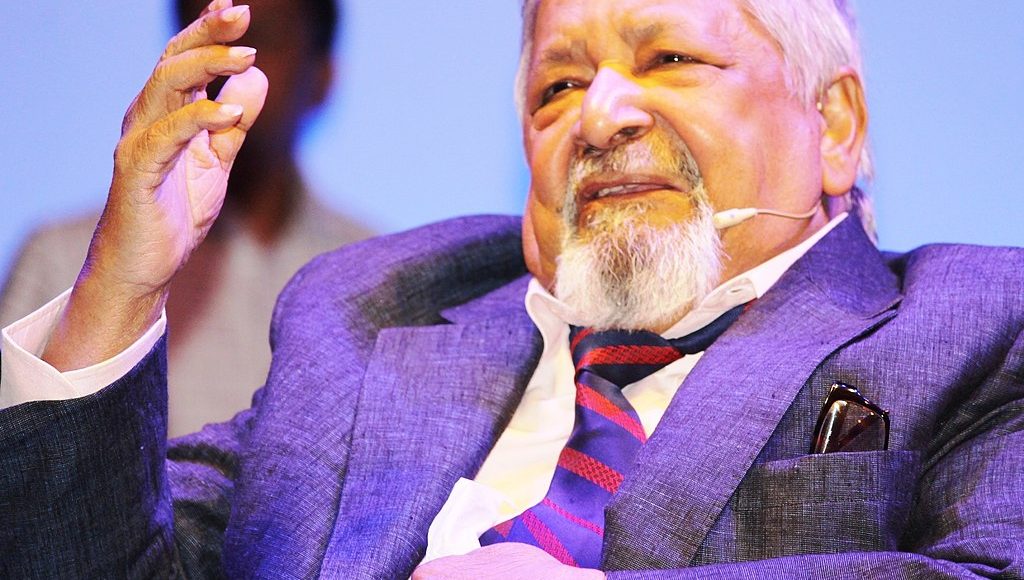V. S. Naipaul
Biography
V. S. Naipaul was born in Chaguanas, Trinidad in 1932. The grandson of indentured labourers brought over from India to work on the Trinidad sugar plantations, he was a brilliant and driven student, and won a government scholarship to read English at University College, Oxford. He would stay in the UK for the rest of his writing life. Naipaul’s work spans different prose genres, both fictional and non-fictional, and is often grouped into three phases. His early Trinidadian satires included his landmark book A House for Mr Biswas (1961). In the 1970s and 80s, his writing ranged more widely across the decolonising world in works such as A Bend in the River (1979). His late work, most famously The Enigma of Arrival (1987), scrutinizes acts of perception and writing itself. Naipaul won the Booker Prize for In a Free State in 1971 and the Nobel Prize for Literature in 2001.
Naipaul’s fictional and non-fictional writings trace a self-conscious symptomatic response to the need to discover an appropriate literary form to frame a psychic and symbolic sense of homelessness.
Writing

V. S. Naipaul in Dhaka, 2016, Faizul Latif Chowdhury (CC BY-SA 4.0) via Wikimedia Commons
When, in the 1980s, Boris Ford was charged with compiling his influential history, The New Pelican Guide to English Literature, he chose titles which told the story in terms of a succession of literary titans. Volume One, ‘The Age of Chaucer’, was succeeded by volumes chronicling the ‘Ages’ of Shakespeare and so on. The final volume in the series was titled ‘From Orwell to Naipaul’.
It is a title which must have flattered Naipaul, who tried throughout his life both to insert himself in the ‘Great Tradition’ of English letters, and to assert his singular, special place within it. But it also shows the breadth and nature of Naipaul’s reputation through the 1970s, 80s and 90s. A pioneering non-white author, achieving fame across and beyond the world’s largest Anglophone markets, he also wrote with a ‘literary sophistication’ recognisable to British critics. Naipaul was heralded as a harbinger of the new ‘Commonwealth’ or ‘postcolonial’ literatures: an inheritor of the British tradition yet one who manifested its new, democratic global range.
Fittingly, inheritance became Naipaul’s subject. Within that ‘Great Tradition’ of English letters, no-one since Shakespeare had written so powerfully about fathers, or the anxieties of being a son. Naipaul’s own father, Seepersad, had emerged from an illiterate family of plantation labourers to become a journalist and one of the first Indian-Trinidadian writers to publish creative work in English. Seepersad’s ambition, his febrile kindness, and his psychological fragility is registered with subtlety and tenderness in A House for Mr Biswas, The Mimic Men, and other works, always from the perspective of a son driven to embarrassment and cruelty when he recognises himself in his father. Through the figure of Seepersad, Naipaul draws a link between genealogical and literary ‘filiation’. Both Naipaul’s early and his late books, Biswas and Enigma, describe the difficulties of breaking free from biological and literary ‘parents’.
Today, Naipaul’s work is deeply controversial, and it is easy to see why. His obsessive focus on fathers and sons leaves mothers and daughters out of the frame. With the exception of Shama and Savi in Biswas (modelled on his mother, and his beloved sister Kamla), women often exist in his books as ciphers, or objects of violence. Moreover, the model of literary filiation he describes now seems increasingly outdated. It would seem retrograde, to say the least, to describe modern Caribbean authors as anxious children of their British parents. Nonetheless, as Teju Cole notes, Naipaul’s influence on an ‘entire generation of post-colonial writers’ was vast, and its presence continues to be felt. His body of work is a remarkable document in the history of colonial encounter, tracing the psychological ambiguities and agonies of that passing moment in which the old British Empire was passing away and the postcolonial future – for Trinidad – appeared undecided, fraught and open.
—William Ghosh, 2018
Cite this: Ghosh, William. “[scf-post-title].” Postcolonial Writers Make Worlds, 2018, [scf-post-permalink]. Accessed 6 February 2026.
